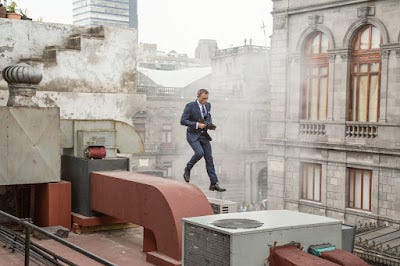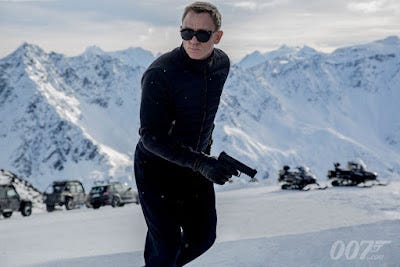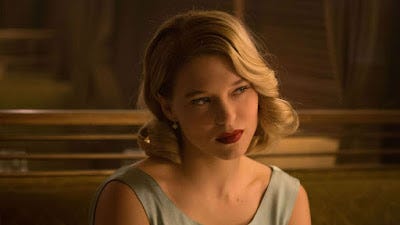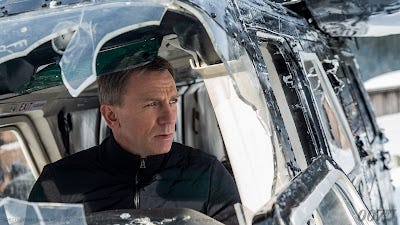Review: "Spectre" is bursting with potential, and wastes nearly all of it

Here’s something you may not know about me: I am a huge James Bond fan, and there is little I look forward to more in this world than the chance to sit down with a good 007 movie. Naturally, the latest film in the franchise, Spectre, has been one of my most anticipated movies of the year. Having finally seen it, I can definitively say…that it’s a James Bond movie. Not a great one. Not a terrible one. But certainly a middling and disappointing one, especially when judged by the high standards it clearly sets for itself.
The film is arriving on a bad weekend for me, however, and I do not have a ton of time (or energy) to devote to a full, formal review. So instead, we’re going to take this point by point, as a series of notes and observations, with spoilers included throughout (I really don’t know how to discuss this particular film without them). Not the most polished thing I’ve ever published, but then, this is hardly the most polished James Bond film. So it goes.
Spoilers for Spectre coming up after the jump…
--The pre-credits sequence is outstanding. Set at a Mexican Dia de los Muertos celebration, the sequence is absolutely jaw-dropping in scale, and endlessly creative and confident in execution. While Casino Royale has a very clever opening, Sam Mendes is the first director of the Daniel Craig era to really understand just how meaty and fun these pre-credits sequences should be; at their best, they should serve as great James Bond short films, and with both Skyfall and Spectre, he has crafted some tremendous 007 adventures in miniature. The Skyfall opening is much more effective in terms of laying the groundwork for the film to come, but on its own, I like the Spectre opening even more. That first take, which is long and complex and seemingly uninterrupted, is equal parts breathtaking and playful, and the scale on which that extended helicopter stunt takes place is just vintage James Bond – preposterous, and well-executed enough to earn every ludicrous beat. I would easily put this in the running for the best pre-credits sequence in the series, right alongside other highlights like On Her Majesty’s Secret Service, Moonraker, GoldenEye, and, yes, Skyfall. And this is at least one area where Spectre absolutely has Skyfall topped, so there’s that…
--The opening credits themselves are great. Not all-time great, but fun and evocative, suggestive of a more thematically rich and complex film than we wind up getting. And it definitely enhances Sam Smith’s middling “The Writing on the Wall,” which is a plus. This isn’t up to the level of the best 007 openings, but at this point, Daniel Kleinman and his team know what they are doing, and they pretty reliable deliver a good opening each time out.
--The gun barrel intro has been returned back to its rightful place at the start of the picture. This makes me inordinately happy.
--I like Bond’s relationship with all the new status quo characters – Moneypenny, M, and especially Q – very much. There’s a good support system in place there, and while there are absolutely standout scenes with each of them, I think they each wind up being underutilized, or at least utilized in less than ideal ways. For instance, I like the rapport between 007 and Ralph Fiennes’ M, and I like the hard but fair edge Fiennes brings to the role, but I don’t need this many extended sequences of M having adventures on his own. That’s not the point of M. And with the shadow of Judi Dench still hanging over the franchise – by invitation, given the narrative of Spectre – they needed to find a better way of distinguishing this M than having him fight bureaucracy, because that’s what Dench was made to do in nearly all her appearances, especially Skyfall. And while it’s hard to find anything to complain about with Ben Whishaw’s Q – this is just a note-perfect match of actor and material, and he and Craig share wonderful chemistry – that he becomes the film’s unquestioned deus ex machina in the end is lazy and disappointing.
--Speaking of Q, while I am slightly disappointed that the Rome car chase didn’t end with the revelation that Bond’s new car could turn into a submarine – watching Craig’s 007 drive an underwater car would be amazing on so many levels – the parachute eject-button, and particularly Craig’s reaction to the whole ordeal, more than made up for it. A very nice touch.
--That being said, how on earth can you have James Bond make a visit to the Alps – and take a trip to a snowy mountaintop clinic a la On Hey Majesty’s Secret Service, no less – and not have 007 get involved in an over-the-top ski chase? That’s James Bond 101 right there – 007 sees snow, and he is somehow compelled to chase or be chased by frantically skiing down a mountain. That’s just how it works. I don’t care how much money you have to throw around with your fancy prop-plane chase sequence – James Bond descends mountains by skiing, or in extreme cases, bobsledding. If you’re going to have him order his martinis shaken, not stirred, or continue to introduce himself last name first, then he also has to inexplicably ski at every opportunity – it’s just what he does.

--It really is incredible, overall, just how strong a command of the 007 tone and tropes Mendes has in some moments, and how limp and lifeless the film can feel in others. There are some sequences Mendes hits so far out of the park, I really do find it jaw-dropping; the opening is one, certainly, but I also love Bond’s encounter with Monica Bellucci’s character. The way it is shot, with Bond and her reflected in a mirror, the visual dynamic slowly shifting over the course of the scene, is gorgeous, romantic, and sweeping to a degree most of Bond’s sexual encounters strive for, but rarely pull off. And his staging of the Spectre secret meeting is even better, slow and tense and mysterious and incredibly atmospheric, a bigger and better version of all those oft-parodied ‘nefarious council’ scenes from older 007 movies. I love it. And that just makes me scratch my head when we get to a sequence like Blofeld’s torture of Bond, or really anything from the climax of the film, where tension and atmosphere seem to be completely outside Mendes’ grasp. There is some awful dialogue and exposition at work in those moments, granted, but not only do those scenes barely feel like fully-realized parts of a James Bond movie, they barely feel like much of anything. And blandness, to me, is just about the greatest sin a 007 movie can commit.
--Hoyte van Hoytema’s cinematography is thoroughly beyond reproach, though, and if this isn’t quite as visually stunning a film as Skyfall – still, to my mind, the most glorious use of digital photography in mainstream feature filmmaking yet – Spectre is one hell of a good-looking movie. Mendes may not always be able to elevate things, but Hoytema’s sharp, keen eye is always worthy of interest, and I think the more muted, shadowy palate he’s gone for here is a good match with the return to 35mm photography. This is probably the second-best looking 007 movie to date, right behind Skyfall, and that’s nothing to sneeze at.
--I am not, however, a fan of Thomas Newman’s score this time around. I like the work he did on Skyfall plenty, but Spectre is egregiously overscored – the aforementioned secret meeting sequence is the quietest scene in the movie, and that it is also one of the best is no coincidence – and much of the music is so tonally out of whack with the imagery and pace. The direction and cinematography are sure-footed enough that I don’t need Newman to bang me over the head with ‘suspense!’ or ‘menace!’ or ‘excitement!’ the way he does here. And then there are cues that sound too lighthearted in scenes that should feel more serious, or cues that are too overbearing in scenes that seem much more lighthearted. It’s a messy score, and I really found myself missing David Arnold this time around. Not all of his scores were particularly memorable, but he met each movie where it was at – scoring films as divergent as Die Another Day and Casino Royale with equal effectiveness – and I think he is, overall, a better composer for the needs of this series.
--Dave Bautista is an Odd Job-esque villainous henchman? I can get behind that. It really seems like Spectre wanted to be a sillier, more overtly over-the-top 007 adventure at some point in its development. I think that could have worked wonderfully – ditch the continuity, up the camp, and let everyone cut loose and have fun. James Bond is built for that, and I think Craig’s performance could adapt easily. But alas, Spectre does not, in the end, commit to much in the way of a clear tonal direction at all.
--While the first act is an awful lot of fun, filled with intrigue and momentum, Spectre falls into a choppy, uneven rhythm pretty soon, as Bond hops around the world from one exotic location to the next, never staying for long and rarely letting any sense of atmosphere settle in. All 007 movies have their fair share of globetrotting, but Bond generally settles in one place for the majority of an adventure, and that sense of focus is sorely missing here. The second act is propulsive, but also moves through a lot of locations, set pieces, and screen time without doing much to advance the plot or, God forbid, allow the characters and relationships to develop. When Spectre slows down and allows itself to breathe, it is capable of some wonderfully effective moments. But the structure is such that those become increasingly few and far between, and the promise of the first act eventually wears down to a sense of exhaustion.

--On that note, I really like the work Léa Seydoux is doing here as romantic interest Madeline Swann, and I think she has some interesting chemistry with Daniel Craig. But the script gives her precious little to play, and that the relationship winds up being so central to the ‘substance’ of the climax – with the suggestion that this might, in fact, be real love for James Bond – really shines a light on how little the writing does to develop this pairing. When 007 movies want to make Bond feel something more than raw sexual attraction, they are generally good at doing so – see On Her Majesty’s Secret Service or Casino Royale for evidence. But the effort put in here is minimal, and especially given that Swann is, essentially, the first major Bond girl of the Craig era after Vesper Lynd, this character feels like a big swing and a miss.
--The script is awful. I don’t know how else to put it. There are four credited writers at work here – series vets Neal Purvis and Robert Wade, Skyfall co-writer John Logan, and newcomer Jez Butterworth – and it doesn’t feel like even one of them had a clear idea for what to do with this story. That results in a whole lot of large-scale issues, which we’ll talk about soon, but it also means that the moment-to-moment dialogue can be really rough. There are some choice one-liners here and there, but for the most part, a lot of the jokes feel half-hearted and flat, and given that this attempts to be the most overtly humorous of the Craig films so far, that’s a shame. I very much like the idea of letting Craig be funny, because in a particular deadpan way, he can be absolutely hilarious. Casino Royale especially is a really funny movie, driven by a specific headstrong energy Craig brings to the part, but nothing in Spectre really feels tailored to his singular take on Bond. Craig does good work, as always, but the script is flat enough that he feels stranded more often than not, rarely given any material that truly takes advantage of what he brings to the part. If this actually does wind up being his last movie, that will be a tremendous shame, because I think you could pluck just about anyone into the part this time and the movie would barely feel any different. And when you have a James Bond as transcendent as Daniel Craig, that feels somewhat criminal.
--So we might as well talk about the big issue here, which is Spectre itself, and the return of Ernst Stavro Blofeld, in the form of Christoph Waltz. What a mess. Eon has been working for decades to try to get the rights back to the Spectre characters, and the finished film barely capitalizes on any of it. We get that one creepy sequence early on, and from there on out, nothing. Spectre is nefariously planning to take over the world’s surveillance. Why? Because why not, is pretty much the extent of what we’re told. There doesn’t seem to be any real scale to their plan, nor any extreme difficulty in putting a stop to it (Q punches his keyboard for a few minutes and viola!). We are told, time and time again, that Spectre is behind all the evil plots from the Craig films so far, but are given no specifics beyond those generalities – we are just meant to take Blofeld’s taunts on faith, I guess – and by the end of the film, it is not even clear how big or powerful this organization even is. Will they continue without Blofeld? Is MI6 going to continue investigating all those other evil plots Bond overheard Spectre discussing? Have they infiltrated the government, and if so, can they be stopped? Quantum of Solace did a vastly better job painting Quantum as all-powerful big-bads, but Spectre is supposed to be several steps up from that. And when you’re lagging behind Quantum of Solace, you know you’re doing something wrong.
--Far worse than all this, though, is the portrayal of Blofeld himself. Christoph Waltz is clearly game, and effectively unsettling in his first few appearances, but the newly-invented backstory is such a tremendous waste of breath I cannot even understand the effort. Tying 007 in this directly with Blofeld is such a huge alteration of how we generally understand and conceive of James Bond that there better be a damn good reason for doing so – and instead, all we get is the knowledge that Blofeld’s father briefly took in young James, Blofeld got jealous, and now he pettily wants further revenge. Really? You finally, after decades and decades of trying, got the rights back to do Blofeld again, and the best you can do is turn him into a jealous older brother? Someone so petty he would risk his own life and, I assume, the entire organizational foundation of his shadowy crime syndicate just to fly to London and screw with James Bond’s head through silly smoke-and-mirror tactics?
(To be perfectly fair, Blofeld is usually a pretty pathetic character whenever he steps out of the shadows. He’s a lot more terrifying with his face and features obscured than he is when we actually get to know him. But this should have been a chance to rectify that, to make Blofeld scary and daunting once again, and instead, this is by far the limpest portrayal of the character yet. Dr. Evil was more intimidating than this).

--It’s a sign of just how underbaked and ill-advised this entire narrative is that, in trying to build a story around secrets from James Bond’s past, it does far less to illuminate 007 as a character than any of the prior three Craig films. So James Bond once lived with a guy who would turn out to be a woefully ineffective villain. So what? Is that supposed to make us find greater depth in James Bond? Is that supposed to make him find something deeper within himself? The way Craig plays it, it seems Bond barely remembers or cares about Blofeld, and that once all the smoke has cleared, he won’t walk away from this experience with any particular emotional scars. The furthest the film goes in terms of character development is simply reinforcing the central themes of Skyfall: that Bond is built to do this work, to be a blunt instrument and devote his life for Queen and country, and that he will forever be wired this way. Good. You gave us the cliff-notes version of Skyfall. Great work there, Spectre. So glad you had nothing to contribute. It’s not that I need every 007 film to be a character study, mind you – I don’t, but the Craig films have all structured themselves that way, and Spectre follows suit without following through. It fails by its own ambition, not by any standards I personally have for it.
--Spectre suffers from many of the same issues as Quantum of Solace, in that it is the follow up to an all-time great James Bond film, is almost entirely reactionary to its predecessor. The events of Skyfall are the groundwork for this film, just as Quantum uses Casino Royale as its foundation, and Spectre is constantly recalling or copying Skyfall to much less effective results. I never needed Spectre to rise to the level of its predecessor – that would be extraordinarily difficult. I just needed a solid, fun 007 flick. But by tying itself this strongly to a truly great movie, Spectre directly invites unflattering comparisons at every turn. It just goes to show, when all is said and done, that overarching narrative continuity and James Bond do not and should not go together. The more you try to weave these stories together, the less the individual narrative has room to pop. The events of Spectre never seem to matter because they are all completely in service to prior, stronger narratives. It was the problem with Quantum of Solace too, and I hope this film is the nail in the coffin for Eon trying to serialize these films. It doesn’t work. Skyfall was the perfect model – a standalone story that pays off on prior installments by further developing the characters, rather than continually trying to weave a larger narrative web. I don’t want James Bond to be serialized, and if the half-hearted Spectre is any indication, it doesn’t seem like anyone working on these films feels particularly enthusiastic about the idea either.
And that’s about all I have. Spectre is not a bad film, and I think there are enough fun and engaging elements here and there to make it worthwhile for fans of the series. But this is middle-tier 007 at best, and it so completely fails to come together into anything cohesive that I doubt this will be an entry anyone winds up revisiting much. At least a truly bad or strange James Bond film, like Moonraker or Licence to Kill, can be weird or wacky enough to be memorable and fun. Spectre is entertaining, and often impeccably crafted, but it is so much more middling than this series should be at its best. It feels like the franchise has been in the midst of an identity crisis for a while now, and whether the Craig era continues past this film or not, I hope Eon takes stock of what has and hasn’t worked over these past four films, and course corrects towards something less ambitious and ultimately more effective. The pieces are in place. They have a great 007, a tremendous sense of style and atmosphere, a penchant for location and action…but somehow, this last decade of Bond keeps vacillating between the masterful and the mediocre. If they need to take another long break to figure the next one out, so be it. More than anything else, Spectre often feels obligatory, and that’s when Bond tends to sink to its lowest points. I sincerely hope that, whenever the time comes to make another one of these, it gets made because everyone involves has a truly good idea, and a passion to tell a fun or inventive story, rather than to throw a whole lot of resources and narrative floundering at the wall in order to see what sticks. Spectre doesn’t muddy the franchise, or mar Daniel Craig’s legacy, or anything so hyperbolic as that; but it does disappoint, and for the best action series out there, that’s always a sad and sobering thing to confront.

